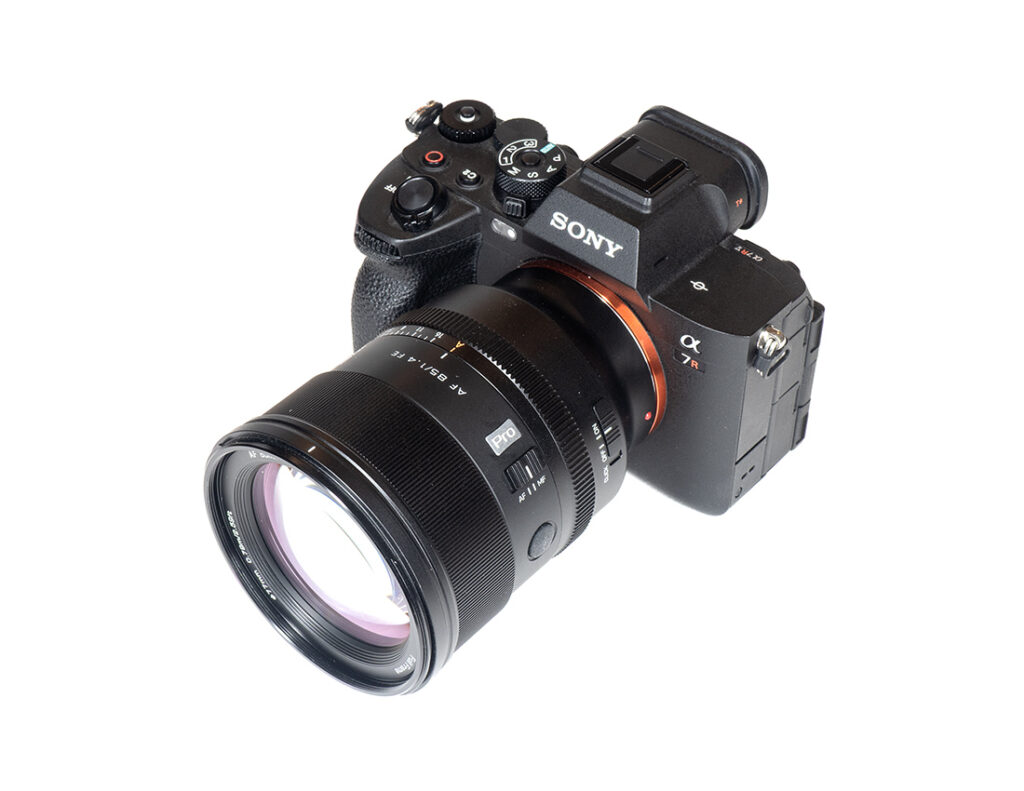Viltrox is obviously busy ramping up their high-speed prime lens offering. Recently, we reviewed their great AF 35mm f/1.2 LAB FE. And now, they’ve got a new contender to the crown in the medium tele segment – the Viltrox AF 85mm f/1.4 PRO FE. Viltrox “PRO” lenses classify their medium grade lens lineup – a step up from their “Air” series, but a level down from the LABs. Fortunately, this also translates to a quite attractive price point of $598 USD or 669 EUR (£569, $869 CAD, ¥98,600). So let’s see what you could get for your hard-earned money.
The build quality of the Viltrox AF 85mm f/1.4 PRO FE is excellent thanks to a tightly assembled all-metal design. At 800g, it is on the heavy side, though. Weather sealing is provided and combined with the inner focusing system, it should be able to provide some protection against the elements. The focus ring turns smoothly. In terms of controls, there is also a de-clickable aperture ring. This is not an infinitely turning ring, but the aperture values are clearly marked on the barrel – yours truly certainly prefers this implementation over the one in the AF 35mm f/1.2 LAB. There is also a custom button and the usual AF/MF switch. A petal-shaped lens hood is included.
The lens uses a “VCM” (Voice-coil Motor) for autofocusing. It’s a linear motor, instead of the simpler stepping variant. It did a good job in the 35mm f/1.2 LAB, and it doesn’t disappoint in the AF 85mm f/1.4 PRO either. The AF is quite snappy (update to firmware v1.0.3+, v1.0.2 has a bug), although it stays a bit short of Sony’s own XD AF. Firmware updates are possible via the Viltrox app (also desktop now) and USB-C connection. The app can also be used to configure the custom Fn button. Manual focusing works by wire – as usual. This works well.
As of the time of this review, the lens is only available in Sony E-mount, but we reckon that at least Nikon Z mount will be offered down the line.

| Specifications | |
|---|---|
| Optical construction | 15 elements in 11 groups (3x ED, 9x HR, 1x aspherical) |
| Number of aperture blades | 11 |
| min. focus distance | 0.79m (max magnification: 0.13x) |
| Dimensions | φ84.5 × 108.5mm |
| Weight | 800g |
| Filter size | φ77mm |
| Hood | petal-shaped (bayonet mount, supplied) |
| Other features | Aperture ring (de-clickable) Fn custom button Firmware updates via USB-C/Bluetooth Dust and moisture-resistant |
Distortions
The lens produces a native image distortion of ~0.5% pincushion-style. This is better than usual in this age of mirrorless cameras. Viltrox does not provide a correction profile (at the time of this writing). However, the level is low enough to be irrelevant in most scenes anyway.
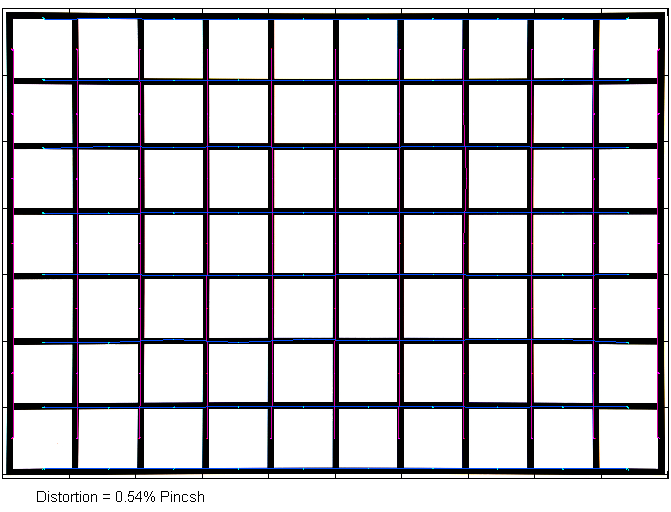
Vignetting
The raw vignetting is typical for an ultra-fast medium tele lens. At f/1.4, the light falloff exceeds 2 EV (f-stops). Stopping down to f/2 cuts this down by 2/3 EV. And it’s acceptable from f/2.8.
Strangely, there is no correction profile for vignetting either, although Viltrox does so with other lenses. We hope they’ll add one via firmware later. Having said that, vignetting can be easily corrected in post.
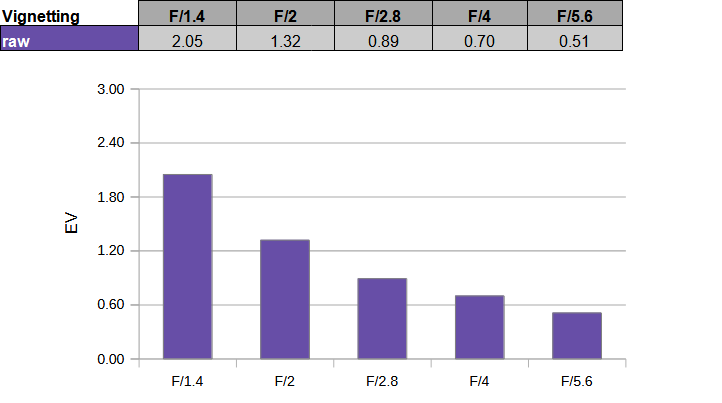
MTF (resolution) at 42 megapixels
The Viltrox AF 85mm f/1.4 PRO FE is very sharp at all mainstream aperture settings. The center quality is very good to excellent at f/1.4, and the outer image field is easily on a very good level. Stopping down to f/2 provides a boost in the broader center – and more so at f/2.8. The outstanding peak quality is reached at f/4. Diffraction is the limiting factor beyond. You won’t really notice this at f/5.6, but f/11 and beyond should be avoided unless you require the depth-of-field.
The centering quality of the tested sample was good. The field curvature is flat.
Please note that the MTF results are not directly comparable across the different systems!
Below is a simplified summary of the formal findings. The chart shows line widths per picture height (LW/PH) which can be taken as a measure of sharpness. If you are keen to know more about the MTF50 figures, you may check out the corresponding Imatest Explanations.
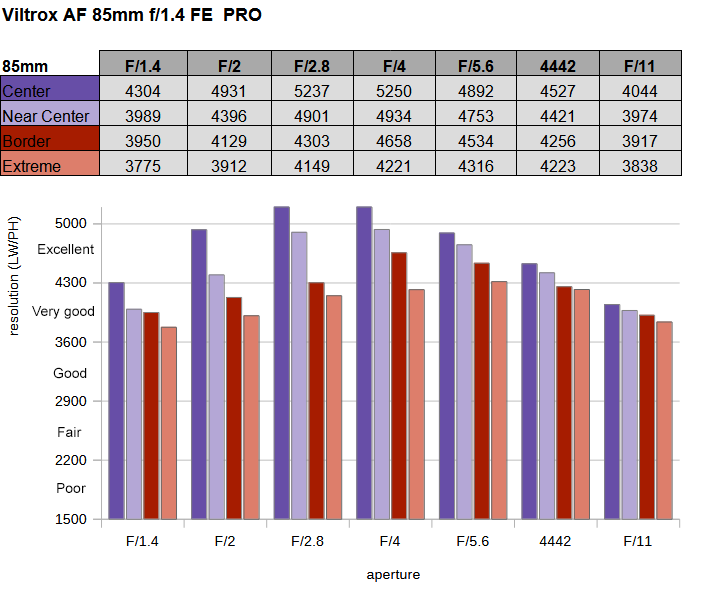
Chromatic Aberrations (CAs)
Lateral CAs are low at large aperture settings, and even decrease somewhat from f/4 onward.

Bokeh
A fast medium tele lens isn’t just about sharpness, but also about the out-of-focus rendering, aka the bokeh – so let’s take a look.
Out-of-focus highlights are nicely rendered near the image center. The inner zone of the discs is very smooth despite two aspherical elements in the design. There is however a distinct outlining at the edges. The circular shape remains intact at f/2. A slight edginess creeps in at f/2.8.

When looking at the highlight rendering across the image field, we can see a shape deterioration from the midfield onward at f/1.4. The corner highlights have a slight cat eye effect, but it’s comparatively subdued (e.g., compared to the Sigma 85mm f/1.4 DG DN). As usual, stopping down increases the “perfect” zone, although the corner shapes aren’t fully restored until f/2.8.
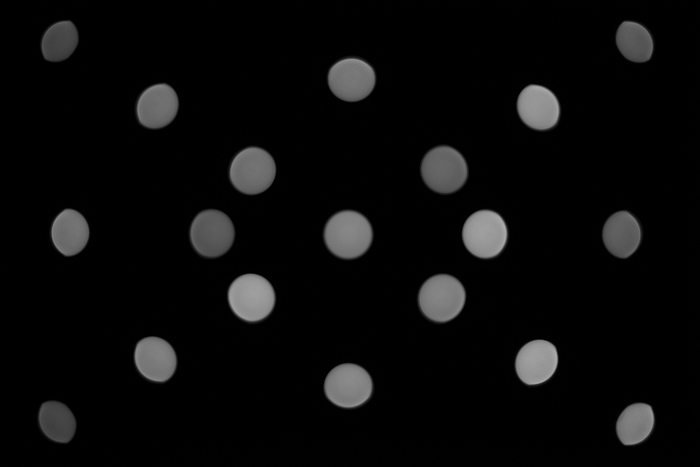
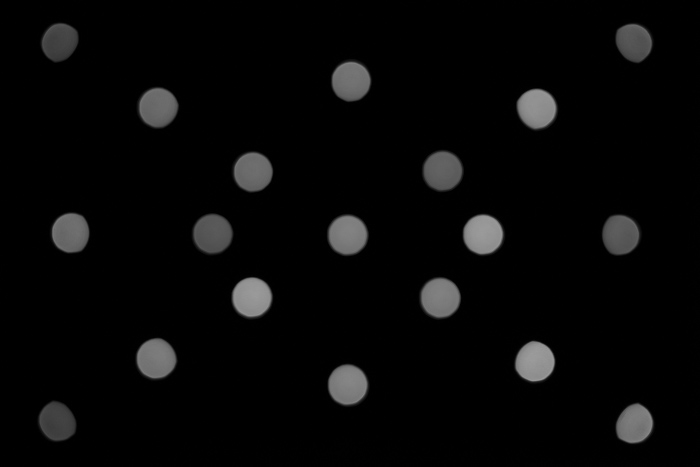
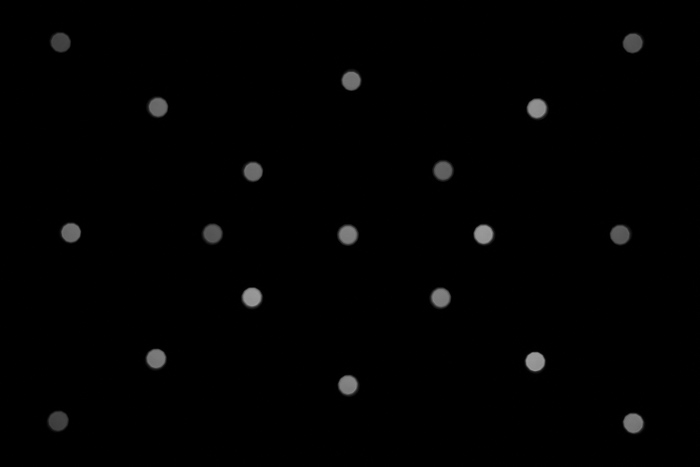
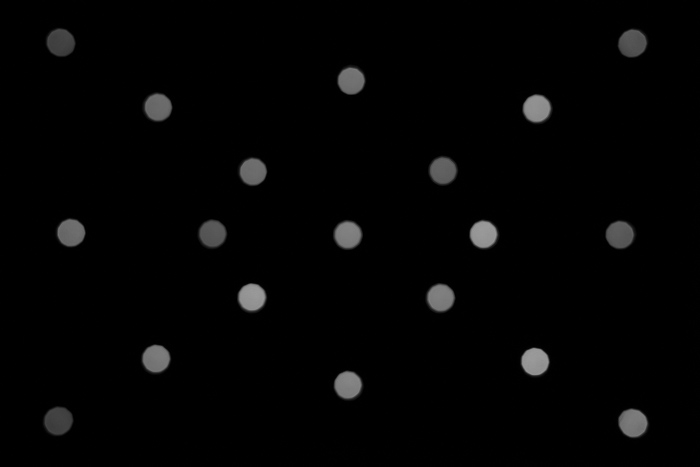
The blur in the focus transition zone is quite smooth in the image background (shown to the left below), but a bit “shadowy” in the less important foreground (to the right).
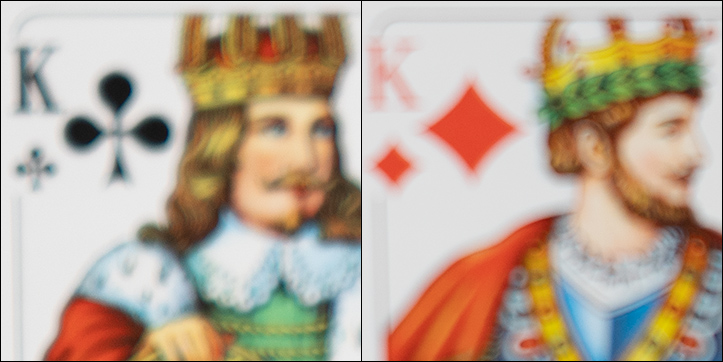
Bokeh Fringing / LoCA
LoCAs, or bokeh fringing, is a color fringing effect on the Z-axis. It shows up with a purplish tint in front of the focus point and a greenish tint behind – and it’s nearly impossible to fully correct in post.
As you can see below, the Viltrox lens shows some color fringing at f/1.4 – with the background being quite “hazy” here. Stopping down to f/2 reduces substantially, and the issue is mostly gone from f/2.8.
There is, however, a noticeable focus shift (RSA – “Residual spherical aberrations”) towards the rear here. Sony cameras autofocus at the set aperture, so unless you use manual focusing, it’s not overly important.
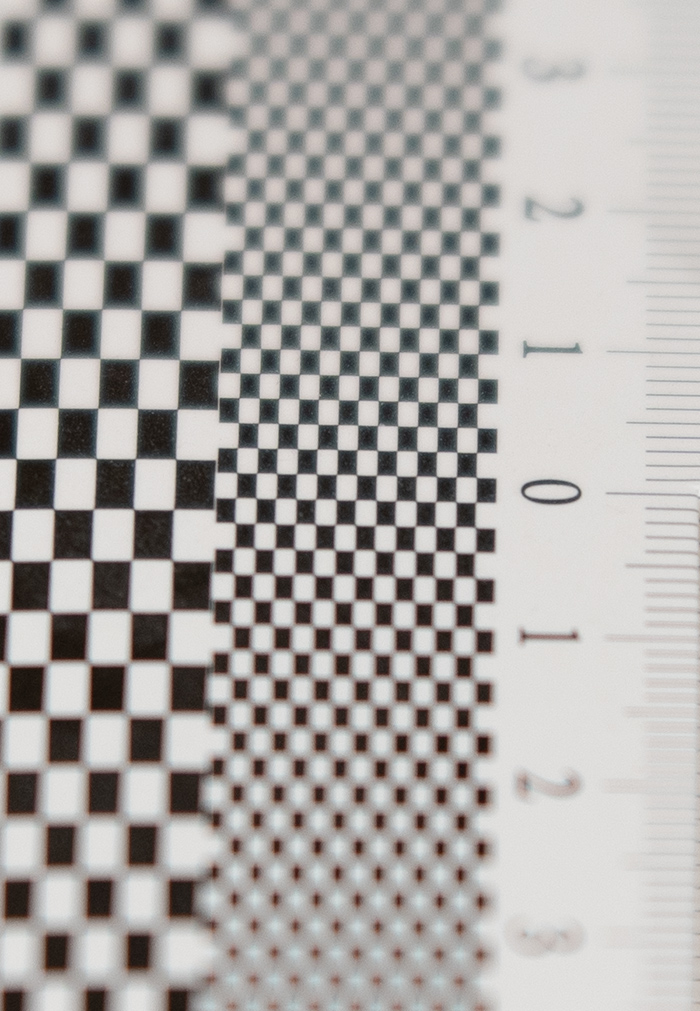
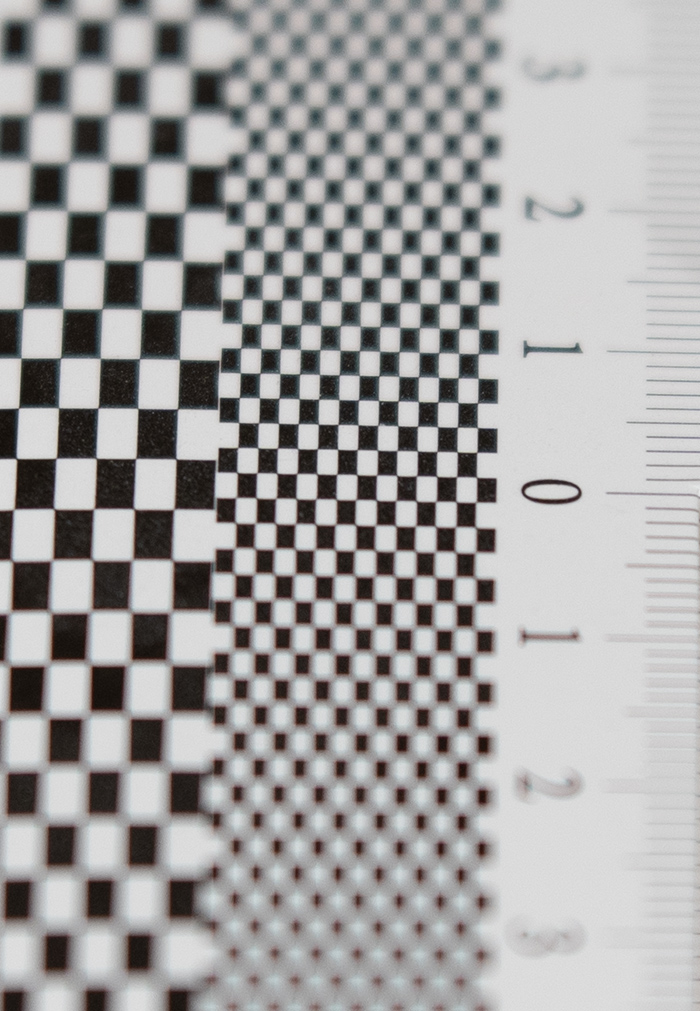
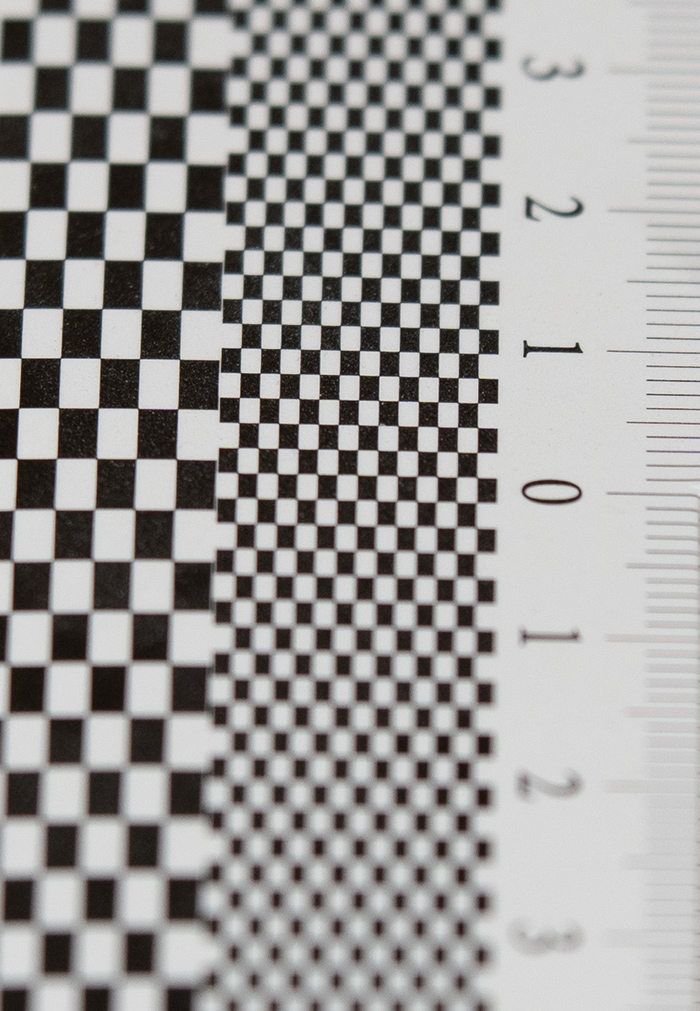
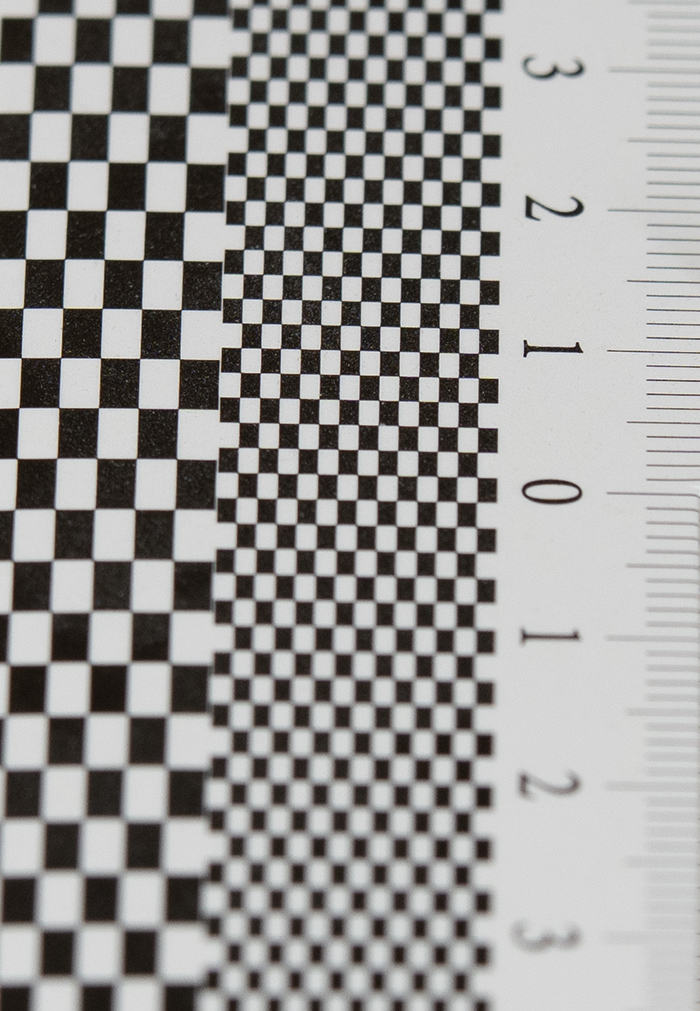
Competition
As always, the competition is plentiful in Sony E-mount. Sony’s own FE 85mm f/1.4 GM II is 3x the price. We haven’t reviewed it yet. It’s probably slightly superior – but whether this is worth this much more may be a question mark. The Sigma 85mm f/1.4 DG DN ART delivered outstanding results in our tests – but it’s still about twice the price, but it is a slightly superior option – also because it has a correction profile. The Samyang AF 85mm f/1.4 FE II is in the same price league as the Viltrox AF 85mm f/1.4 PRO FE. We haven’t tested it yet, so the jury is still out on this one. On the cheaper side of things, there’s the new Sirui Aurora 85mm f/1.4 – as well yet to be tested.
Sample Images
The Viltrox AF 85mm f/1.4 PRO FE delivers a very solid performance with a few caveats. It is already sharp at f/1.4 and great at medium aperture settings - this aspect is about as good as with the "big boys". The lens produces a very slight image distortion and noticeable vignetting at large aperture. It is a bit of a pity that Viltrox didn't implement autocorrection for these. Lateral CAs are low, whereas axial CAs can show up at f/1.4 and f/2. The quality of the bokeh is generally good. There is a focus shift when stopping down, but as long as you are using AF (on Sony cameras), you'll be good.
The build quality is superb. The metal body feels solid as a rock, and the control rings and button feel reassuringly high quality. The AF is good, although it stays slightly below Sony standards.
Overall, a very attractive option that doesn't cost an arm and a leg.
Viltrox lenses can be purchased via their website (Enter OK85145OFF for a little discount) or the usual suspects such as Amazon or B&H.
The Good
- Very sharp
- Great Build Quality
The Bad
- Comparatively heavy
- No built-in auto-correction profile
-
Optical Quality
-
Build Quality
-
Price/Performance


